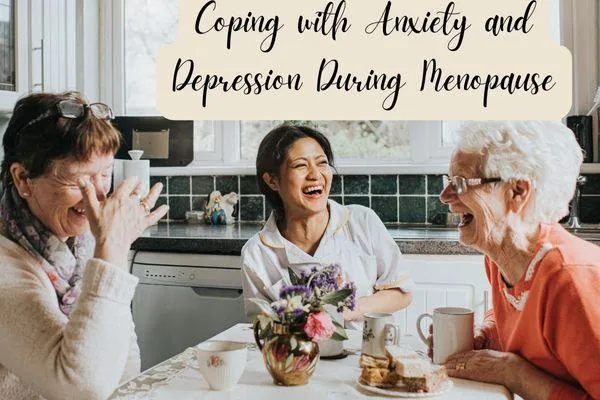Blog
Menopause Midlife & all the ****

Coping with Anxiety and Depression During Menopause
Embrace the change of menopause; it’s a new chapter filled with endless possibilities.
From Chaos to Calm: Mastering Emotional Resilience During Menopause:
Imagine feeling like a stranger to your own emotions, as if your once steady mind and heart have been overtaken by a tempest of chaos. This is the raw reality for many women experiencing menopause. But amidst this hormonal turmoil, there is hope. By mastering emotional resilience, you can navigate the transformative journey of menopause with calm and grace. It’s time to reclaim your emotional strength and find solace amidst the storm.

This page contains affiliate links. If you choose to purchase after clicking a link, I may receive a commission at no extra cost to you.
Understanding Menopause and Emotional Changes
In order to master emotional resilience during the menopause transformation, it is crucial to have a deep understanding of the emotional changes that occur during this transformative phase of life. Menopause is not simply a physical transition, but a multifaceted experience that affects your mental and emotional well-being. By recognising and comprehending these emotional changes, you can better navigate the challenges and embrace the opportunities that menopause presents.
One of the most common emotional changes experienced during menopause is the fluctuation of moods. Hormonal shifts can trigger intense mood swings, making you feel like you're on an emotional rollercoaster. One moment you may find yourself overwhelmed with sadness or irritability, and the next you may feel inexplicably happy or content. Understanding that these mood swings are a natural part of your menopausal journey can help you approach them with a greater sense of acceptance and self-compassion.
Another emotional change that you may encounter during menopause is increased anxiety. The hormonal imbalances that occur can lead to heightened feelings of worry, unease, and even panic. It's important to acknowledge and address these feelings, as chronic anxiety can negatively impact your overall well-being and quality of life.
Additionally, menopause can bring about a sense of loss and grief. As the reproductive years come to an end, you may experience a range of emotions related to letting go of your fertility and the identity associated with it. This emotional journey may involve mourning the loss of the ability to bear children, the end of a specific stage of life, or even the changing dynamics within relationships. By recognising and allowing yourself to process these emotions, you can find healing and growth during this transition.
Moreover, it's important to be aware that menopause can amplify pre-existing emotional conditions, such as depression or mood disorders. If you have a history of mental health issues, it's crucial to be proactive in managing your emotional well-being during menopause.
By understanding the emotional changes associated with menopause, you can approach this phase of life with a sense of empowerment and resilience. It is crucial to remember that menopause is not a sign of weakness, but rather a natural and transformative process that every woman experiences in her own unique way. With this understanding, you can nurture your emotional well-being and navigate the challenges of menopause with grace, strength, and self-compassion.
Self-Care for Emotional Well-Being
Moreover, it's important to be aware that menopause can amplify pre-existing emotional conditions, such as depression or mood disorders. If you have a history of mental health issues, it's crucial to be proactive in managing your emotional well-being during menopause.
One of the most effective strategies for managing your emotional well-being during menopause is practising self-care. Taking the time to prioritise your own needs and engage in activities that bring you joy and relaxation can have a profound impact on your overall emotional resilience. Self-care can take many forms, whether it's indulging in a favourite hobby, setting boundaries to protect your energy, or simply taking a break to recharge.
Engaging in regular exercise is also essential for supporting your emotional well-being during menopause. Exercise has been shown to reduce symptoms of anxiety and depression, increase energy levels, and improve sleep quality. Finding an exercise routine that you enjoy can not only have physical benefits but also provide a much-needed outlet for releasing stress and boosting mood.
In addition to self-care practices, it's important to cultivate a positive mindset and self-compassion during this phase of life. Menopause is a natural and transformative process that every woman experiences in her own unique way. It is crucial to remember that menopause is not a sign of weakness but rather a part of the journey of womanhood. By embracing this perspective, you can nurture your emotional well-being and navigate the challenges of menopause with grace, strength, and self-compassion.
By understanding and implementing self-care practices, fostering a positive mindset, and embracing the transformative nature of menopause, you can enhance your emotional resilience and navigate this phase of life with confidence. Building a supportive network of friends, family, and healthcare professionals can also be instrumental in providing the emotional support and guidance you need.
Building a Supportive Network
Building a supportive network of friends, family, and healthcare professionals can also be instrumental in providing the emotional support and guidance you need.
During menopause, it's essential to surround yourself with people who understand and empathise with your experiences. Your support network can include trusted friends who have gone through menopause themselves, family members who can offer a listening ear, and healthcare professionals who specialise in menopause and women's health. These individuals can provide a safe space for you to discuss your feelings, share your concerns, and seek advice.
When building your support network, seek out individuals who are supportive, understanding, and non-judgmental. Surrounding yourself with positivity and encouragement can make a significant difference in how you navigate the emotional ups and downs of menopause.
In addition to your personal connections, there are also numerous online communities, support groups, and forums dedicated to menopause. Here at Menopause Midlife and all the **** we have a supportive understanding community that can help guide you through this important life stage.
Harnessing Mindfulness and Meditation
With a solid support network in place, you can now explore various practices that harness mindfulness and meditation in order to further cultivate emotional resilience during menopause. Mindfulness and meditation can be powerful tools for managing the intense emotions that can arise during this transitional phase of life.
Practising mindfulness involves paying attention to the present moment with an open and non-judgmental attitude. This can help you become more aware of your thoughts, feelings, and bodily sensations, allowing you to better understand and regulate your emotional responses. By staying grounded in the present moment, you can avoid getting caught up in worries about the future or dwelling on past experiences, which can exacerbate emotional distress.
Meditation, on the other hand, involves intentionally setting aside time to focus on your breath, a mantra, or a specific object. This practice can help calm your mind, reduce stress, and promote greater self-awareness. Regular meditation can also enhance your ability to remain centred and composed when faced with challenging emotions or situations.
To incorporate mindfulness and meditation into your daily routine, you can start with short sessions of just a few minutes and gradually increase the duration as you become more comfortable. Find a quiet and peaceful space where you won't be disturbed, and experiment with different techniques to find what works best for you. Whether it's sitting in silence, following a guided meditation, or engaging in mindful movement practices like yoga or tai chi, there are many approaches to choose from.
Remember, the goal of practising mindfulness and meditation is not to eliminate negative emotions altogether. Instead, it's about developing the skills to observe and accept your emotions without getting overwhelmed by them. By cultivating a sense of inner calm and spaciousness, you can respond to challenging situations with greater clarity and resilience.
Harnessing the power of mindfulness and meditation can support your journey towards emotional resilience during menopause. As you continue to build a strong support network and incorporate these practices into your daily life, you'll be better equipped to navigate the emotional ups and downs with grace and ease. Next, let's explore how developing healthy coping mechanisms can further strengthen your emotional well-being.
Developing Healthy Coping Mechanisms
As you continue on your journey towards emotional resilience during menopause, it's important to also focus on developing healthy coping mechanisms. While mindfulness and meditation are powerful tools, they are just one part of the equation. By incorporating a range of strategies into your daily routine, you can further strengthen your emotional well-being and find serenity amidst the chaos.
One important way to develop healthy coping mechanisms is to prioritise self-care. This includes engaging in activities that bring you joy and relaxation. Whether it's taking a leisurely walk in nature, indulging in a long bath with your favourite essential oils, or simply curling up with a good book, making time for yourself is essential. By nurturing your own well-being, you are better equipped to navigate the challenges that come with menopause.
Another healthy coping mechanism to consider involves engaging in activities that promote emotional release. This could include journaling, painting, or participating in physical exercise. Finding a creative outlet allows you to express and process your emotions in a constructive way. It can be incredibly cathartic to put your feelings into words or let them flow onto a canvas. By releasing these emotions, you create space for healing and growth.
Lastly, practising self-compassion is vital as you navigate the emotional roller coaster of menopause. Remember that it's okay to have bad days, to feel overwhelmed, or to experience a range of emotions. Be gentle with yourself and remind yourself that you are doing the best you can. Treat yourself with kindness and understanding, just as you would a dear friend. By cultivating self-compassion, you can navigate this period of change with greater ease and grace.
By developing healthy coping mechanisms, you are equipping yourself with the tools necessary to navigate the challenges of menopause. These strategies, combined with mindfulness and meditation, form a holistic approach that strengthens your emotional resilience. As we delve into the next section, we'll explore the importance of embracing change and finding serenity during this transformative time.
Embracing Change and Finding Serenity
By developing healthy coping mechanisms and incorporating mindfulness and meditation into your routine, you are equipping yourself with the necessary tools to navigate the challenges of menopause. These strategies form a holistic approach that strengthens your emotional resilience and allows you to embrace change and find serenity during this transformative time.
Menopause is a period of significant change, both physically and emotionally. It's natural to feel a sense of resistance to this change, as it can be unsettling and even overwhelming at times. However, by shifting your perspective and embracing change as an opportunity for growth, you can find a sense of serenity amidst the chaos.
One way to embrace change is by practising gratitude. Take a moment each day to reflect on the things you are grateful for. This simple act can help shift your focus from the challenges of menopause to the positive aspects of your life. It allows you to cultivate a mindset of abundance rather than scarcity, creating a sense of peace and contentment.
Another powerful way to find serenity during menopause is by letting go of control. Understand that there are certain aspects of this transition that are beyond your control, such as hormonal fluctuations or the passage of time. Instead of resisting these factors, practice surrendering to the flow of life. Trust that your body knows what it needs and have faith in your ability to adapt and thrive.
Finding serenity also involves creating space for self-reflection and self-care. Take time each day to nurture yourself, whether it's through engaging in activities that bring you joy, practising relaxation techniques, or connecting with loved ones. By prioritising self-care, you are replenishing your emotional reserves and creating a strong foundation for resilience.
In conclusion, mastering emotional resilience during menopause is not an insurmountable challenge when armed with the right strategies and techniques. By prioritising self-care, seeking support, practising mindfulness, developing healthy coping mechanisms, and embracing change, women can navigate this transformative phase with grace and confidence. As the saying goes, "In the midst of chaos, there is also opportunity." So, seize this opportunity to cultivate your emotional well-being and find serenity amidst the chaos of menopause. At Menopause Midlife and all the **** we have a supportive community of women in just the same life stage as you and will signpost you to various activities you can master on your own or with others. Remember, you have the power to transform chaos into calm. Take action today and discover the resilience within you.
For those of you who prefer the video version
Further reading can be found here:
Embracing Change: Women Thriving in the Midlife Transformation Journey
Your Menopause Self-Mastery Checklist:
Here is a quick checklist for you to think about when taking back control and getting back on track during your menopause transition.
Embrace self-care during menopause
Develop resilience through menopause
Goal-set to thrive through menopause
Join a supportive community Menopause Midlife and all the ****
Nurture healthy relationships during menopause
Leverage emotional intelligence for menopause well-being
Self-reflect and monitor personal growth throughout your menopausal transition.

What Everyone Ought to Know About Menopause in the Workplace
07 March 2022
Menopause affects 100% of women and can have devastating effects on them, their colleagues and their workplace. Does your HR department have a Menopause in the Workplace Policy in place?

Is Your Pension Future Proof?
14 March 2022
In today's financial uncertainty have you planned for your retirement? Could you create a passive income to increase your pension pot?

Menopause Tiredness All The Time
28 March 2022
Every day my inbox is flooded with questions about menopause. People want to know why menopause causes fatigue

The Cost-of-Living Crisis and What you can do to Thrive
04 April 2022
It’s all over the news and social media, there is a rapidly developing cost of living crisis. For many there already was and has been for some time.

5 Common Symptoms of Perimenopause and Understand How to Accept Them
11 April 2022
Let’s just make it clear; 100% of women will go through perimenopause and on into menopause. 99% of women going through ‘The Change’ will experience some symptoms that can affect daily life to some degree.

Can You Start an Online Business When You're Over 50?
18 April 2022
Like most of us I didn’t always have a flexible work regime and found myself working hours for a fixed income that didn’t quite meet the lifestyle I wanted to lead.
In fact, it was not all that long ago that I had to totally reassess what I was doing and where I wanted to be.

26 April 2022
Coping With Empty Nest Syndrome as a Single Parent
As if coping with midlife, erratic hormones and perimenopause was not enough, the children who you have spent the most significant part of your life nurturing and raising are ready to leave home and spread their wings.





